Health Care Professionals Participating at FDA
Survey of Health Care Practitioners for Device Labeling Format and Content
Attachment H--Sample Complete Labeling in Standard Content Format Acuvue
Health Care Professionals Participating at FDA
OMB: 0910-0790
FDA Standard Content Version
Define 1-Day ACUVUE Brand Contact Lenses
Generated from J&J Labeling (August 2014)
“Cover” page includes the following:
Define 1-Day ACUVUE Brand Contact Lenses with Lacreon
etafilcon A Soft (hydrophilic) Contact lenses Cosmetically Tinted
with UV Blocker for Daily Disposable Wear
August, 2014
TABLE OF CONTENTS
1.0 Indications for Use
1.1 Purpose
1.1.1 Single use
1.1.2 Prescription use only
1.1.3 Where used
1.2 Intended Use Population
2.0 Individual Patient Selection Considerations
3.0 Contraindications
4.0 General Warnings and Precautions
4.1 Eye Problems Leading to Vision Loss
4.2 Specific Instructions for Use and Warnings about Water
Activity
4.3 UV Absorption and Radiation Exposure
4.4 Special Precautions for Eye Care Professionals
4.5 Instructions for Patients
4.5.1 Handling precautions
4.5.2 Lens wearing precautions
4.5.3 Lens care precautions
4.5.4 Emergencies
4.5.5 Other topics to discuss with patients
4.5.6 Who should know that the patient is wearing contact lenses?
5.0 Adverse Events
6.0 Device Description
6.1 Available Lens Parameters
Diameter
Center thickness
Base curve
Power range
6.2 Lens Properties
6.3 Oxygen Permeability
6.4 How Supplied
6.5 Theory of Operation
7.0 Instructions for Use
7.2 Preparation
7.2.1 General fitting guidelines
Pre-fitting examination
Initial power determination
7.2.2 Monovision fitting guidelines
Monovision needs assessment
Patient education
Eye selection
Ocular preference determination methods
Refractive error method
Visual demands method
Unilateral vision correction requirement
Near ADD determination
7.3 Use
7.3.1 Base curve selection (trial lens fitting)
Criteria of a properly fit lens
Criteria of a flat fitting lens
Criteria of a steep Fitting lens
7.3.2 Final lens power
7.3.3 Trial lens fitting – monovision
Adaptation
Other suggestions
7.4 After Use
7.4.1 Wearing schedule
7.4.2 Replacement schedule
7.4.3 Lens care directions
Basic instructions
Care for a sticking (non-moving) lens
7.4.4 Patient management
Dispensing visit
Follow-up examinations
Recommended follow-up examination
Recommended procedures for follow-up visits
12.0 Glossary
12.1 Symbols Key
13.0 Resources
Transmittance curves
Citations
14.0 Contact and Reporting Information
15.0 Date of Latest Revision
1.0 Indications for Use

1.1 Purpose
1.1.1 Single use
1.1.2 Prescription use only
![]()
1.1.3 Where used
Indicated for use in any clinical or non-clinical environment.
1.2 Intended Use Population
Indicated for use in the general population.
2.0 Individual Patient Selection Considerations


3.0 Contraindications
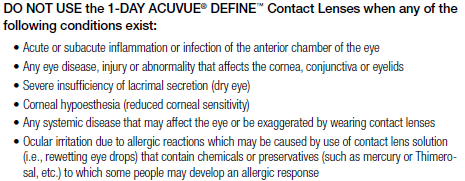

4.0 General Warnings and Precautions
4.1 Eye Problems leading to Vision Loss

4.2 Specific Instructions for Use and Warnings about Water
Activity

![]()
4.3 UV Absorption and Radiation Exposure

![]()

4.4 Special Precautions for Eye Care Professionals


4.5 Instructions for Patients
![]()
4.5.1 Handling precautions
![]()
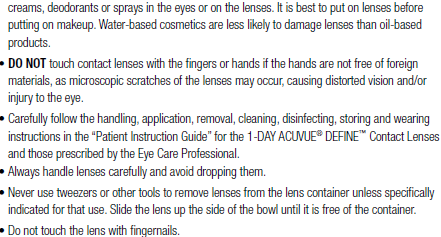
4.5.2 Lens wearing precautions
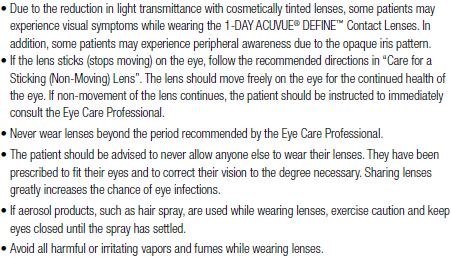
4.5.3 Lens care precautions

4.5.4 Emergencies

4.5.5 Other topics to discuss with patients




4.5.6 Who should know that the patient is wearing
contact lenses?

5.0 Adverse Events
![]()
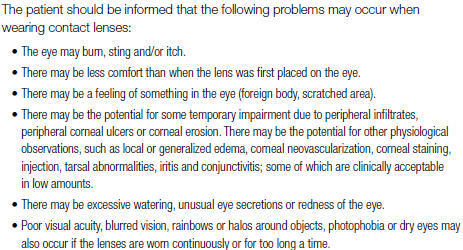
6.0 Device Description


6.1 Available Lens Parameters
![]()


6.2 Lens Properties
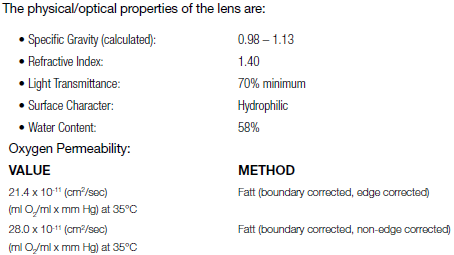
6.3 Oxygen Permeability

6.4 How Supplied

6.5 Theory of Operation

7.0 Instructions for Use
7.2 Preparation
7.2.1 General fitting guidelines
Pre-fitting examination

Initial Power Determination

7.2.2 Monovision fitting guidelines
Monovision needs assessment

![]()
Patient education

Eye selection

Unilateral vision correction requirement
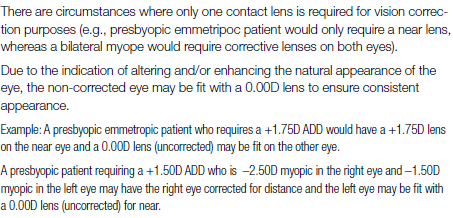
Near ADD determination

7.3 Use
7.3.1 Base curve selection (trial lens fitting)

Criteria of a properly fit lens

Criteria of a flat fitting lens

Criteria of a steep fitting lens

7.3.2 Final lens power


7.3.3 Trial lens fitting – monovision
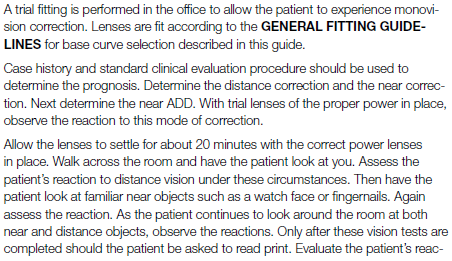

Adaptation

Other suggestions


![]()
7.4 After Use
7.4.1 Wearing schedule

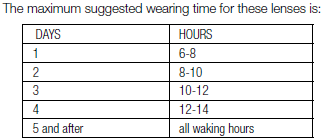
7.4.2 Replacement schedule

7.4.3 Lens care directions

Basic instructions


Care for a sticking (non-moving) lens

7.4.4 Patient management
Dispensing visit
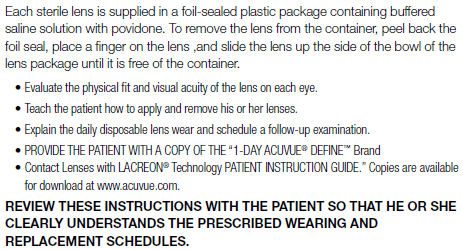
Follow-up examinations

Recommended follow-up examination
![]()
![]()
![]()
Recommended procedures for follow-up visits

12.0 Glossary
12.1 Symbols Key

13.0 Resources
Transmittance curves

Citations
Lerman, S., Radient Energy and the Eye, MacMillan, New York, 1980, p.58 figure 2-21
Waxler, M. Hitchins, V.M., Optical Radiation and Visual Health, CRC Press, Boca Raton, Florida, 1987, p.19, figure 5
New England Journal of Medicine, September 21, 1989, 321 (12), pp. 773-783
The CLAO Journal, July 1999, Volume 25, Number 3
14.0 Contact and Reporting Information

15.0 Date of Latest Revision
![]()
| File Type | application/vnd.openxmlformats-officedocument.wordprocessingml.document |
| Author | Nancy Ostrove;Chris Medberry |
| File Modified | 0000-00-00 |
| File Created | 2021-01-25 |
© 2026 OMB.report | Privacy Policy